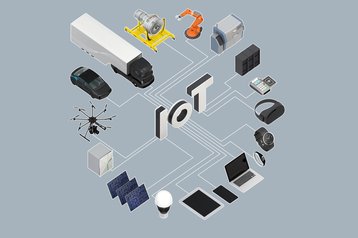The ‘business case’ is a necessary part of business management but it is not going to necessarily make you more effective. Think about the ubiquitous cell phone. I recall when I worked in tech ops in the late 90’s the cell phone became the de facto communications platform for the operations person, but I don’t recall ever seeing a business case, it just made sense. Likewise, in fast moving tech, waiting for a solid business case before launching a new product or embracing a new capability may mean you are late to the game, so don’t be a slave to the ‘business case’ philosophy.
IoT is all around
Internet of things (IoT) is here, it’s real and it’s gaining momentum … some might say this is the advent of a new technology wave that will transform how we live, others might suggest that it’s repackaging a concept that is decades old. Regardless, all manner of devices are now smart, connected and increasingly contextual. This expectation is not a part of a feature set, it’s a minimum requirement.
In the data center, the central strategy should be integrating power optimization systems with sensor-enabled products. The goal is to create a data-driven, intelligently automated solution that balances data center operations with the most cost-efficient power sources in real time to maximize data center power efficiency for its customers. Intelligently connected IT reduces costs and optimizes the data center resources.
What next for the data center operator?
In my view IoT is better described as ‘digital operations’. It’s about providing customers with the ability to control, interrogate and modify their operational tasks in response to external signals. It’s about making operations more reliable, more cost effective and easier to execute.
Digital operations will not replace people, in fact there is strong evidence that we are facing a skills shortage in the data center operations discipline. Digital operations will simply make them more effective. We want to better understand what our customers are trying to achieve and then couple that expectation with our technology.
In my view IoT is better described as ‘digital operations’
We have distilled our view down to 3 key characteristics of the next generation data center, where digitizing the ‘how’ will make the ‘what’ more effective.
We contend that rather than being distracted by all that market noise and hype there are a few simple steps to ensure your business can take advantage of digital operations.
- Make sure any components and systems can be networked, everything from your grid transformer to the humble low-voltage circuit breaker.
- Assess new communications platforms and protocols to ensure you are deploying the most effective network. A great example here is using IEC61850 to reduce physical cables and points of failure across your infrastructure.
- Challenge your supplier to demonstrate that their solution and approach is elastic, that it can add and subtract capacity on demand and in response to other signals.
Now you should have the digital platform to make your operations smarter.
What next?
You can now transform your operational tasks into software driven activity, you can extract operational data to identify trends and failure modes, and you can transform how you manage your maintenance regime to reduce downtime.
With IoT we can have more harmonized operations, digitizing the power train from humble current sensors to power managers up to cloud enabled automation. We can reduce the amount of communications cable you need as we shift from analogue to digital and we can replace analogue sensors with their digital equivalent – software driven and dynamically configurable.
The quest for the perfect business case may just hold you back, while your competition get to increasing levels of efficiency, reliability and flexibility. Get ready today to make your infrastructure fit for tomorrow and beyond.
Ciaran Flanagan is head of data center business development at ABB



